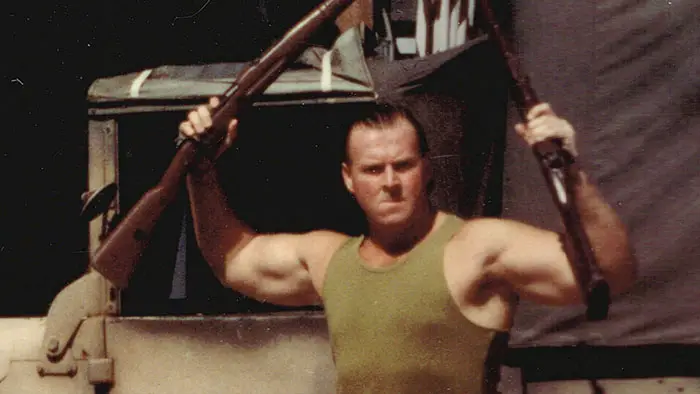
Years and years of allowing himself to be beaten up on a regular basis has taken its toll, and Donahue, in separate circumstances, has torn his quadriceps in both (you read that right, both!) knees: an extraordinarily rare occasion. Yet, Donahue takes the attitude of “it’s better to burn out than to fade away” (a mantra alluded to by Donahue himself though he can’t recall the exact words), as his wife plays the role of the worrier. Lori accepts her husband’s chosen profession and recognizes his clear joie de vivre, but when all is said and done, she wishes he would relinquish a position where the job description is, literally, to kick a*s.

“The Guy’s attitude towards life is inspiring to anyone – stuntman, actor, or librarian.”
The film makes evident that Donahue confronts his mortality daily. In one particularly revealing moment, Donahue relays how he asked Jerry Foley (a director for The Late Show with David Letterman, on which Donahue had a recurring sketch bit as the pratfalling “The Guy”) to show him a faux memorial that the show had produced on him. Director McLeavey-Fisher does an effective job in conveying Donahue’s sense of ephemerality with lots of slo-mo shots of Donahue going about his day-to-day, looking pensively into the distance, etc.
The Guy’s attitude towards life is inspiring to anyone – stuntman, actor, or librarian. The movie showcases the passion with which Donahue undertakes any assignment or plot twist life presents him with. One of Donahue’s favorite quotes is from one of his coaches at UT: “Are you injured, or are you hurt?” The implication in the coach’s words is that if you are injured, you are down for the count; if you are hurt, get your a*s up and keep moving. That seems to be how Donahue lives his life. Coming from a man that throws punches and gets glass bottles broken over his head on a consistent basis, I’ll take that advice to heart.

"…"...she wishes he would relinquish a position where the job description is, literally, to kick ass.""


